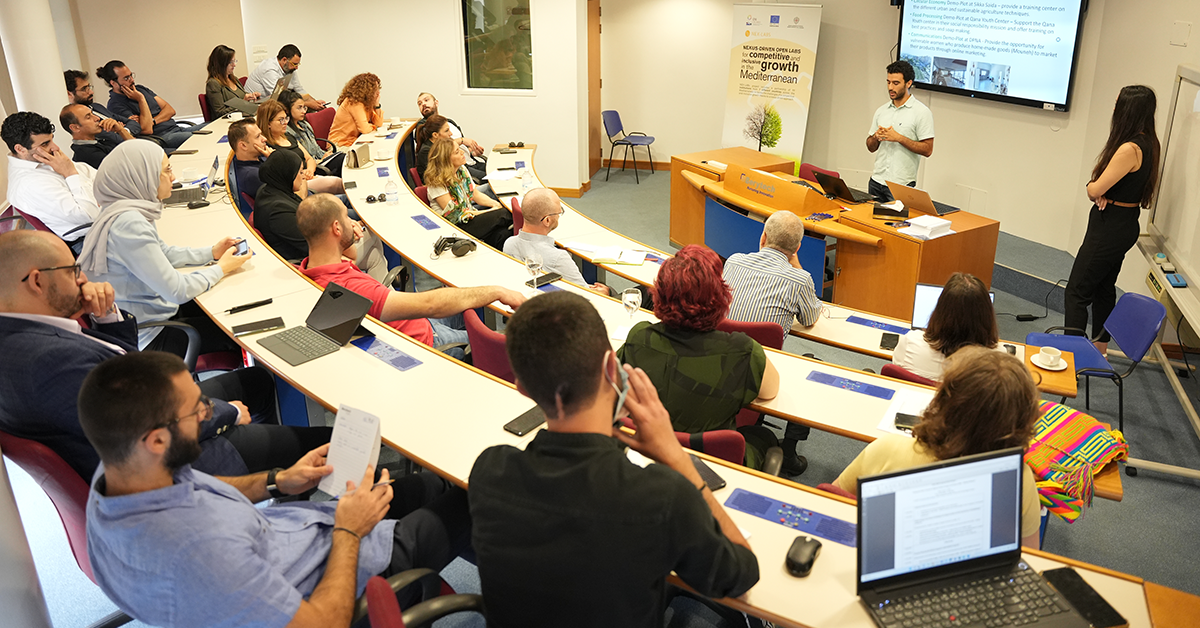
The Living Labs are a great initiative being brought forward to Lebanon and the region under the NEX-LABS project. It intends to establish an open space called Living Labs that brings together scientists, industries, society, and business communities that are NEXUS-driven to collaborate, innovate and co-create the future of the Water, Energy and Food (WEF) -NEXUS sector.
On June 7, 2022, a summit was held at Berytech Mar Roukoz, gathering 20 stakeholders coming from NGOs, academia, entrepreneurship, and the public sector in the field of WEF-NEXUS to discuss the strategy for developing a sustainable NEX-LABS Living Lab that tackles the challenges faced in Lebanon in the WEF sectors.
The Importance of a Living Lab
A circular conference was held during the launching of the Living Labs, discussing the challenges and opportunities of the Water Energy Food Nexus sector, showcasing the current reality, research, innovations, and new trends of the WEF–NEXUS field in the Middle East/North Africa (MENA) region.
Dr. Nadim Farajalla, Program Director at the American University of Beirut – Issam Fares Institute (AUB-IFI), introduced and defined the WEF–NEXUS Living Lab as a new methodology to support ecosystem actors to co-design solutions addressing WEF–NEXUS challenges. The Environmental and Sustainable Development Unit at the American University of Beirut presented and discussed their current living labs across Lebanon.
Key Takeaways
The WEF-NEXUS challenges faced in Lebanon and the world are due to climate change and population growth, overconsumption of water due to the agriculture sector, and increased energy footprint. The current management in place for the water and energy sectors does not account for it being cross-sectorial.
While the WEF-NEXUS has become a buzz term that is applied haphazardly in Lebanon, the technical implementation is facing challenges due to the absence of precise and uniform data and the inconsistent decision-making is due to the difference in lifecycle perspectives for the three main NEXUS nodes.
Meanwhile, opportunities in Lebanon and the world are increasing for three main reasons: price, security, and funding. The price of food and commodities is increasing, similar to agri-chemical products, creating a demand to produce agri-chemical products at a lower price.
The COVID-19 pandemic and the war between Ukraine and Russia showed the importance of water, food, and energy security, as the supply of food and energy was destabilized. At the same time, international bodies are encouraging the WEF-NEXUS approach by providing funding for initiatives.
In Lebanon, the Ministry of Energy and Water with the Ministry of Agriculture need to develop common strategies in the WEF-NEXUS, creating policies that are inclusive, holistic, and science based.
Scenario Planning & Networking
The main objective of the scenario planning exercise moderated by Tina El Boustany, Head of Grants and Financial Controls – WE4F MENA at Berytech, was to work on proposing solutions to successfully design, make use, and sustain a WEF–NEXUS Living Lab in Lebanon.
The main outcomes of this session were to work together towards creating and developing regulations and policies, increase the commitment of user engagement based on creating value for citizens and highlighting the benefits of the Living Lab, create a strong brand image of the Living Lab, which will be recognized as a pillar entity for the Water, Energy Food Nexus, piloting the projects to filter innovation and keep the trust of investors.
A NEX-LABS Entrepreneurs Corner Space was available for NEXUS stakeholders to meet and share common challenges faced in Lebanon and the opportunities present. The networking session was to encourage synergies when discussing demands and offers to face NEXUS challenges.
About NEX-LABS
NEX-LABS is a project co-funded by the European Union under the ENI CBC Mediterranean Sea Basin Programme and has the goal to set up a Strategy for Sustainable Development focusing on the NEXUS of Water, Energy, and Food (WEF) in the MENA region.
NEX-LABS project aims to support the implementation of clean technologies for the sustainable and resilient growth of agri-food sector production based on more efficient use of energy (renewable/solar solutions) and water (wastewater treatment, water harvesting or reuse solutions) in Mediterranean Partner Countries region thanks to the contribution of ICT such as blockchain technology, Internet of the Things (IoT), Artificial Intelligence (AI), Machine Learning and Big Data.
NEX-LABS targeted territories, characterized by water scarcity and both an irregular rainfall and population distribution, reflect agriculture as the largest user of water (70-90%) while future global warming projections (≈2ºC) are expected to cause a decrease in summer precipitation (-10/-30%), threatening water availability (-2/-15%) and agricultural productivity (-12/-40%). The latent conflict between energy efficiency (≈60%) and water production is also increasing the energy footprint/m3 of water used to produce food. The predicted shortfalls in Water/Energy/Food (WEF) require a NEXUS approach, which means integrated management and governance of these natural resources.
NEX-LABS project includes a partnership of 11 institutions (Autonomous University of Barcelona (Spain), Chamber of Commerce and Industry of the Center Tunisia), Royal Scientific Society- Aqaba Liaison Center (JO), Berytech Foundation (LB), INNOLABS SRL (IT), Academy of Scientific Research and Technology (EG), American University of Beirut (LB), Centre for promotional services to enterprises – Special Agency of Cagliari Chamber of Commerce (IT), Net7 Srl (IT), C.I.P Citizens In Power (CY), The Jordanian Hashemite Fund for Human Development /Princess Basma Community Development Centre Aqaba (JO)) from 7 different countries across the Mediterranean. The project is funded by the European Union under the ENI CBC Med Programme. With a total budget of €3.450.984,97, the project has received a contribution of € 3.105.866,47 (90%).









